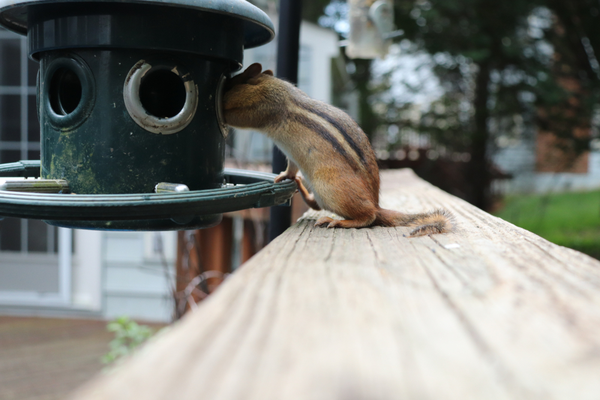Chipmunks end up in homes more often than you think. While they’re foraging for food to cache, they may accidentally squeeze or even fall into your home. They’ll squeeze through gaps in window frames or foundations, dash through screen doors, or even dig into your crawl space.
Chipmunks end up finding their way into your home because something nearby attracts them to it. The hyper little rodents’ lives revolve around food, so chances are the reason they’re near you is to find some. To keep chipmunks out of your home reliably, you have to answer two questions: how did that chipmunk get inside your home, and why do it want to be near your home in the first place? We can answer both of those questions:
How Do Chipmunks Get Into My House?
Open doors
This… probably sounds obvious, but it happens frequently enough that we should mention it. It’s possible that a chipmunk could get into your home the same way you do: through the door! If you keep your door propped open while moving something or unpacking, a chipmunk could take the opportunity to scamper inside. This happens particularly frequently in fall when chipmunks are even more hyperactive than usual.
Open garage doors
Chipmunks will wander around pretty much everywhere they can in pursuit of food and shelter. This includes your garage and any other parts of your home they could access. Chipmunks frequently dash into garages and may even stay inside for a surprising length of time. If you leave your garage door open, you’re welcoming the furry little rascals inside to poke around.
Screens
Screen doors are probably the most common way chipmunk enter homes. They’ll either push their way through damaged screens or leap through all at once. Chipmunks likely won’t even necessarily mean to charge inside. Sometimes, a chipmunk will even eat through window screens and then enter through the damage they inflict!
Cracks in frames
Cracks and gaps in door and window frames are classic rodent infiltration routes. Chipmunks require more space to squeeze through than rats or mice, but they can still get occasionally inside homes using frames. Usually, a chipmunk works their way through gaps either by accident or when they’re desperate.
Cracks in foundation
Shear cracks and gaps in the foundation will allow chipmunks to sneak into your basement from outside directly. While pursuing food or wandering around, chipmunks fall into foundation cracks and work their way inside out of curiosity.
Crawl spaces
Chipmunks can dig burrows that are between 10 to 30 feet deep. If your crawl space has a dirt floor, a chipmunk could burrow through to it from outside. Once inside, they may even use your crawl space as a part of their burrow.

What attracts chipmunks to my house?
Bird feeders
Birds aren’t the only thing bird feeders attract. Unfortunately, feeders tend to spill a lot of their birdseed on the ground. Chipmunks use this birdseed as a valuable source of food. In fact, they’ll often… help the birdseed fall to the ground.
Fallen nuts and seeds
Like squirrels, chipmunks prepare for winter by caching food supplies. In order to cache enough food, they start early and pretty much never stop. Chipmunks are particularly interested in collecting non-perishable foods like nuts and seeds.
Berry bushes
Berries are a valuable food source for chipmunks. If you have berry bushes in your yard, they'll frequent your yard more often than usual to collect their fallen fruit. A chipmunk tends to rely on nearby berry bushes especially heavily in fall. They’ll even burrow or otherwise establish their home dens nearby.
Garbage
Chipmunks are looking to grab as much food as possible, as quickly as possible. While they aren’t as attracted to garbage as larger foragers, they’ll still use it if they can. Chipmunks can climb into garbage dumpsters quite easily. They’ll stick around to eat for as long as they can.
Gardens
Gardens are an attractive food source to all kinds of wildlife, chipmunks included. Chipmunks will feed on flowers, stems, stalks, and roots. They’ll even dig up newly planted seeds to cache for themselves if given the opportunity. Unprotected, open gardens are particularly attractive to pest wildlife.
Yard clutter
Like most small mammals, chipmunks have to hide and sneak to evade predators and competition. They’re attracted to shady, cluttered yards where they can find hiding places easily. They’ll use these hiding places to creep closer to your home to find food and shelter if they can.
If you have a chipmunk in your home, give Varment Guard a call right away. We can remove wildlife from your home quickly, humanely, and effectively. We’ll figure out how and why the chipmunk got inside in the first place while we’re at it.






